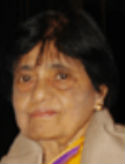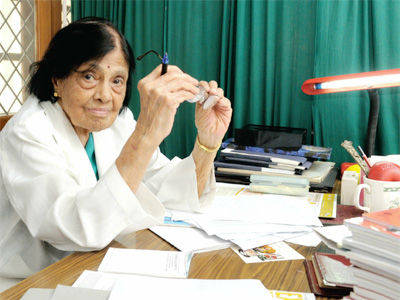Dr Sivaramakrishna Padmavati
Dr Sivaramakrishna Padmavati
India’s first & oldest woman heart specialist
- A.V.Murali Manohar
 Dr. Sivaramakrishna Iyer Padmavati commonly known as Dr. S. Padmavati (born 1917) is an eminent Indian cardiologist. She is the director of the National Heart Institute, Delhi and the founder president of the All India Heart Foundation. The institute collaborates with the World Health Organisation (WHO) in training students in preventive cardiology.
Dr. Sivaramakrishna Iyer Padmavati commonly known as Dr. S. Padmavati (born 1917) is an eminent Indian cardiologist. She is the director of the National Heart Institute, Delhi and the founder president of the All India Heart Foundation. The institute collaborates with the World Health Organisation (WHO) in training students in preventive cardiology.
She was the first woman cardiologist in India in 1954 and established the first cardiac clinic and cardiac cath lab in North India. She was the President of 5th World Congress of Cardiology, New Delhi (1966), and was awarded India's second highest civilian honour the Padma Vibhushan in 1992.
At the age of 96, she still does the rounds of the hospital she founded and active now as she was when she started treating patients in India 60 years ago. Dr. Padmavati, says cardiology is a very demanding field that was keeping women away, but things are changing.
Dr Padmavati, chief consultant in cardiology at the National Heart Institute, said: “There is no routine; no fixed hours… it is a very demanding field… so not many women choose to become cardiologists.
She is not just the mother figure or god figure, but she is the god of cardiology in India," says renowned cardiologist Dr Ashok Seth of Fortis Escorts Heart Institute about Dr Padmavati.
Dr. Padmavati not only trained herself in cardiology from the UK and the US in the late '40s and the early '50s, but also taught several of India's best cardiologists, notes Seth. "She is profoundly knowledgeable. She created the whole concept of heart treatment in India from scratch," he adds.
 "I have seen the world of cardiology grow under my eyes," says Padmavati. The cardiology veteran has many firsts to her credit: she is India's first woman cardiologist; she set up the country's first cardiology clinic; she created the first cardiology department in an Indian medical college; she founded India's first heart foundation meant to spread awareness about diseases of the heart.
"I have seen the world of cardiology grow under my eyes," says Padmavati. The cardiology veteran has many firsts to her credit: she is India's first woman cardiologist; she set up the country's first cardiology clinic; she created the first cardiology department in an Indian medical college; she founded India's first heart foundation meant to spread awareness about diseases of the heart.
She was born in Burma (now called Myanmar) in 1917, on the year of the October Revolution that redrew the world's political map and she had three brothers and two sisters. Her father and elder brother were barristers and she grew up in Mergui, near the oil fields of Burma. A brilliant student, she stood first in the province in her final school examination.
And then she went on to study medicine at the Rangoon Medical College where she was the first female student. The young maverick completed her MBBS magna cum laude, earning the best outgoing student medal and several other distinctions. "I won so many honours that I can't remember all of them," says Padmavati, who picked up what she calls her "craze" for swimming during her "Burma days".
She has kept at it: she swims every day for six months a year at the Ford Foundation's exclusive swimming pool in Delhi. In Delhi's winter and for the rest of the months of the year, she prefers long walks.
She learnt the art of reading from her dad whom she says was devoted to books. "I am the custodian of the library here [at the National Heart Institute in south Delhi] and reading helps me keep abreast of the latest developments in cardiology," she says.
Just after she completed her medical studies in Rangoon, Japan invaded Burma at the height of World War II and she had to return to India. "We had to run for our lives, literally," says the noted cardiologist. "My parents were told to vacate the house in 24 hours. My father was there for many, many years. Then we had to fly out from Mergui by the last flight. The men were left behind and only the women went. Things were quite bad," she recalls.
Padmavati, her sister Janaki and their mother came to Tamil Nadu and bought a home in Coimbatore. For the next three years, until 1945, there was no news of the men of the family. When the war ended, the family was reunited.
In the year 1949 she moved to London, where she received a FRCP from Royal College of Physicians, London followed by FRCPE from Royal College of Physicians of Edinburgh. Here while working at hospitals like the National Heart Hospital, National Chest Hospital, and the National Hospital, Queen Square, London, she developed interest in cardiology.
Subsequently, after finishing her FRCP, she moved to Sweden for three months, where she took cardiology courses at the Southern Hospital. Meanwhile, she applied for fellowship at the Johns Hopkins Hospital, Baltimore, part of Johns Hopkins University U.S., and was selected, and went on to study with noted cardiologist Dr. Helen Taussig. In 1952, she joined Harvard Medical School (Harvard University), where she studied under Dr. Paul Dudley White, a pioneer in modern cardiology.
I came to Delhi and started staying with my sister [Janaki] whose husband was a career diplomat," Padmavati says. In the year 1953 She had plans to return to the US to start her practice, but she decided to try her luck in India, she sought an appointment with Rajkumari Amrit Kaur, the then health minister, who offered her a lecturer's position at Delhi's Lady Hardinge Medical College. She accepted the offer. “Lady Hardinge used to be a primitive place then. They had only girls. There were no male patients at that time. Anyway I decided to stay back," she says, emphasising that she was enamoured of the "Gandhian qualities" of the leaders and ministers of the time.
In 1954, she was among the first few women cardiologists in India, later as an examiner with Medical Council of India she started the first DM in cardiology in India.
She joined Maulana Azad Medical College, Delhi in 1967, and was awarded the Padma Bhushan, by Government of India in the same year. She established one of the first departments of cardiology, at the G. B. Pant Hospital, which is within the college campus. She retired as the Director (Principal) of the college, in 1978. She formed All India Heart Foundation (AIHF) in 1962, group of physicians and industrialist Ashok Jain of Bennett, Coleman & Co. Ltd.
She also held additional charge of Delhi's Irwin Hospital (now called Lok Nayak Jai Prakash Narayan Hospital). MAMC had 26 departments and it was Padmavati who introduced the DM course in cardiology, which admits postgraduates. "It was a big undertaking," Padmavati recalls. But then times were different and things much less complicated back then, she adds. Padmavati feels that the bureaucracy was bad then and is worse today. What helped was her direct access to the Lt Governor of Delhi, AN Jha, who helped her tide over bureaucratic red tape.
After retirement from government service in 1981, she helped set up the National Heart Institute (NHI) in Delhi. As director, she had no doubts about her role: to promote research and spread awareness about diseases of the heart. She has been founder-director of the All India Heart Foundation, "a sister concern of NHI" since 1962. In India's rural areas, the foundation holds "heart camps" to familiarise people with the disease and its causes.
It was India's - and Asia's - first exclusive heart institute; its rich successor Escorts Hospital was built in 1988. According to WHO, 17.3 million people died worldwide from cardiovascular diseases in 2008. Of this, 80% of deaths take place in low- and middle-income countries, especially in India, which accounts for 21% of the world's disease burden.
From 20 beds, the institute has now grown to 100 beds. "But it can grow further. Unlike many new hospitals, we don't have money from elsewhere. We get money from what we earn," she says matter-of-factly. She didn't elaborate. She finds it heartening that though heart diseases are on the rise in India due to a variety of reasons, technology and biochemistry have shown rapid growth in combating the menace. "I still touch and use my eyes and ears to treat patients, but I have to know technology, too. You can't stop the march of technology," declares Padmavati, who says she attends at least two global heart conferences a year to keep herself "updated".
As regards the use of medicines to treat heart ailments, this renowned cardiologist, who is also an expert in non-invasive surgery, says, "Treat medicines as your servant. You shouldn't let them become your master." Padmavati sees patients 12 hours a day for five days a week. It helps her that she is a polyglot who speaks Hindi, Tamil, Burmese, a smattering of German and French besides Telugu and Malayalam, she says. "I never married, but I never felt bad about it either because I am always busy with patients and my research," sums up Padmavati whose paternal grandmother lived up to 103. She attributes her longevity to genes, luck and hard work.
Present Position
-
President – All India Heart Foundation
Chief Consultant in Cardiology, National Heart Institute
-
-
President, Asian Pacific Heart Network
-
Corresponding Member – Cardiac Society of Australia and New Zealand.
-
Member, Expert Committee on Cardiovascular Diseases, World Health Organization.
-
Director, Rotary Pacemaker Bank of New Delhi, affiliated to Heartbeat International, U.S.A.
-
Council Member – World Hypertension League.
-
Positions Held Earlier
-
Director – Principal Maulana Azad Medical College and Associated Hospitals, New Delhi.
-
Professor of Medicine, Lady Hardinge Medical College, New Delhi.
Past Affiliations
-
National:President, National Academy of Medical Sciences, President, Cardiological Society of India, Member – Governing Body, All India Institute of Medical Sciences, Member – Governing Body, Indian Council of Medical Research, Dean – Faculty of Medical Sciences and Chairman Board of Research Studies, University of Delhi, Member – Governing Body, Jayadeva Institute of Cardiology, Bangalore.
International:
ISFC (Now WHF):
-
Council Member.
-
Member Council on Epidemiology & Prevention.
-
Member Adhoc Committee on RF/RHD.
-
Secretary General Vth World Congress of Cardiology (1966)
Asian Pacific Society of Cardiology (APSC)
-
1st Secretary General, Later Vice President.
-
Member, Research Committee.
Visiting Professorship
-
University of Kurme, Japan.
-
University of California at San Francisco.
Teaching Experience
-
Over 40 years to undergraduates, postgraduates and postdoctoral Fellows. Examiner in many universities.
****************************************************




